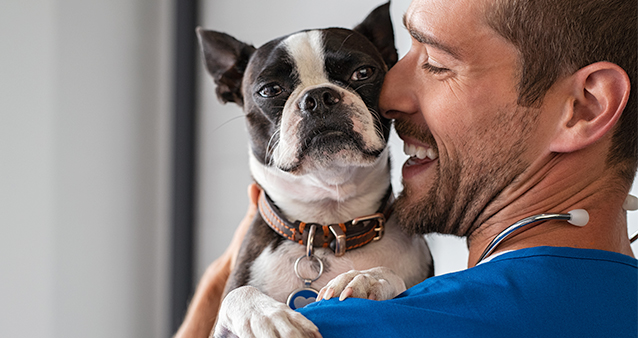Your Pet Vaccination Checklist

"Vaccination" is undeniably a 2021 buzzword. But for once, we're not talking Covid-19; rather, our focus is on pet vaccinations. Here's a handy checklist to keep up to date with your furbabies' vaccinations and booster shots.
Cats and dogs need to be vaccinated to protect them from highly contagious and potentially fatal diseases, some of which also pose a risk to humans. Save yourself heartache, money and potential illness by getting acquainted with your pets' vaccination schedules.
Protecting Your Pup
During your puppy's first (super-sweet, super-chewy) 16 weeks, your vet will become a familiar face as you visit for three vaccine doses.
At around the six- to-eight-week mark, it's time for your puppy's first set of vaccinations. A five-in-one shot, this includes vaccines against:
- Parvovirus: Often fatal, this common viral disease usually hits young puppies. It spreads through infected dogs' blood, stools or vomit and is likely the most important of your puppy's first vaccinations. Parvo is also known as cat flu, due to the initial, incorrect belief that it was transmitted from cats to dogs. This was proven not to be the case, yet the name – and the stigma – lingered. Grumpy Cat is not impressed.
- Distemper: A highly contagious viral disease that affects a dog's lungs, gastrointestinal tract and brain.
- Hepatitis: Infectious canine hepatitis (one type of adenovirus) is a viral disease spread through contact with the stool, urine or saliva of infected animals. It affects the liver, kidneys and cells lining the blood vessels. Symptoms can even include doggy depression.
- Kennel Cough: This is the second type of canine adenovirus covered by the five-in-one vaccine. This virus spreads from dog to dog through sneezing and, you guessed it, coughing.
- Parainfluenza: One of the causes of "kennel cough", this infectious and airborne viral disease affects the respiratory tract and spreads quickly among dogs in close quarters. Hence the name "kennel" cough. Also causing depression, it can reveal itself through flu-like symptoms.
A second five-in-one shot is administered when your growing dog reaches 10 to 12 weeks.
At 12 weeks, it's also time for the first...
- Rabies vaccination: The stuff of nightmares, rabies is a guaranteed pet killer. Attacking the central nervous system, it results in paralysis and death. Rabies vaccinations are legally mandated in South Africa because of the horrific effects the disease can have on humans who are bitten by an infected animal. If it's not caught before the symptoms present themselves in humans, rabies can cause agonising illness and death. That's why animals that are even just suspected of having rabies are put to sleep immediately. What we're saying is, make sure your pup gets its rabies vax!
Between 14 and16 weeks, the last five-in-one shot, as well as the first or second rabies vaccination, is administered. If it's only shot one for rabies, you and your pooch need to return a month later for shot two.
Caring for Your Cat
You'll also be a frequent vet visitor in your kitty's first 16 weeks of life. For cats, the fun starts at eight weeks. This is when they're vaccinated against:
- Calicivirus and rhinotracheitis: Calicivirus and feline herpes virus cause upper respiratory symptoms, such as nose and eye discharge aka rhinotracheitis. Also commonly known as "snuffles" (and no, that's not a good name for your cat), the calicivirus can lead to tongue ulcerations. Ultimately, these diseases can result in dangerous loss of appetite and dehydration in young kittens.
- Panleukopenia: A virus caused by the feline parvovirus, it results in symptoms similar to the parvovirus found in dogs (as described above).
At 12 weeks, it's back to the vet for your kitty's boosters as well as their first non-negotiable rabies vaccination. Then, at 16 weeks, it's time for your feline friend's rabies booster.
Once your dog or cat is vaccinated, it's best to return for annual top-ups and checkups.
What to expect at the vet
Dr David Moore, a vet at Orange Grove Veterinary Hospital, says that vaccinations for cats and dogs are essential to prevent deadly disease. In terms of what to expect from a vaccination appointment, he says it's very similar to a regular vet visit.
"First, your cat or dog is examined to ensure they're in good health and, if all is well, they're given the shot. They shouldn't experience any significant pain," he explains.
An annual check-up, the first of which is administered at your pet's initial vaccination appointment, includes looking deep into your pet's eyes and examining their coat (shiny?), teeth (healthy?), abdomen (strong?) and stools (erm... stooly!), as well as listening to their heart and lungs. At each appointment, be prepared to answer questions about their water and food intake, as well as how often they urinate. Yes, you should be monitoring this.
As with humans, not every pet reacts in the same way after a vaccine, warns Dr Moore. In general, they should continue barking or meowing along as usual. If, however, you notice anything untoward, give your vet a call.
The checklist you've just read describes a bunch of vet visits and, take it from us, the bills start racking up pretty quickly. To ensure your beloved pet's health costs are covered, you should consider Pet Insurance. Use our free tool to compare Pet Insurance quotes.
This article is for informational purposes only and should not be construed as financial, legal or medical advice.
Hippo Blog Categories

































